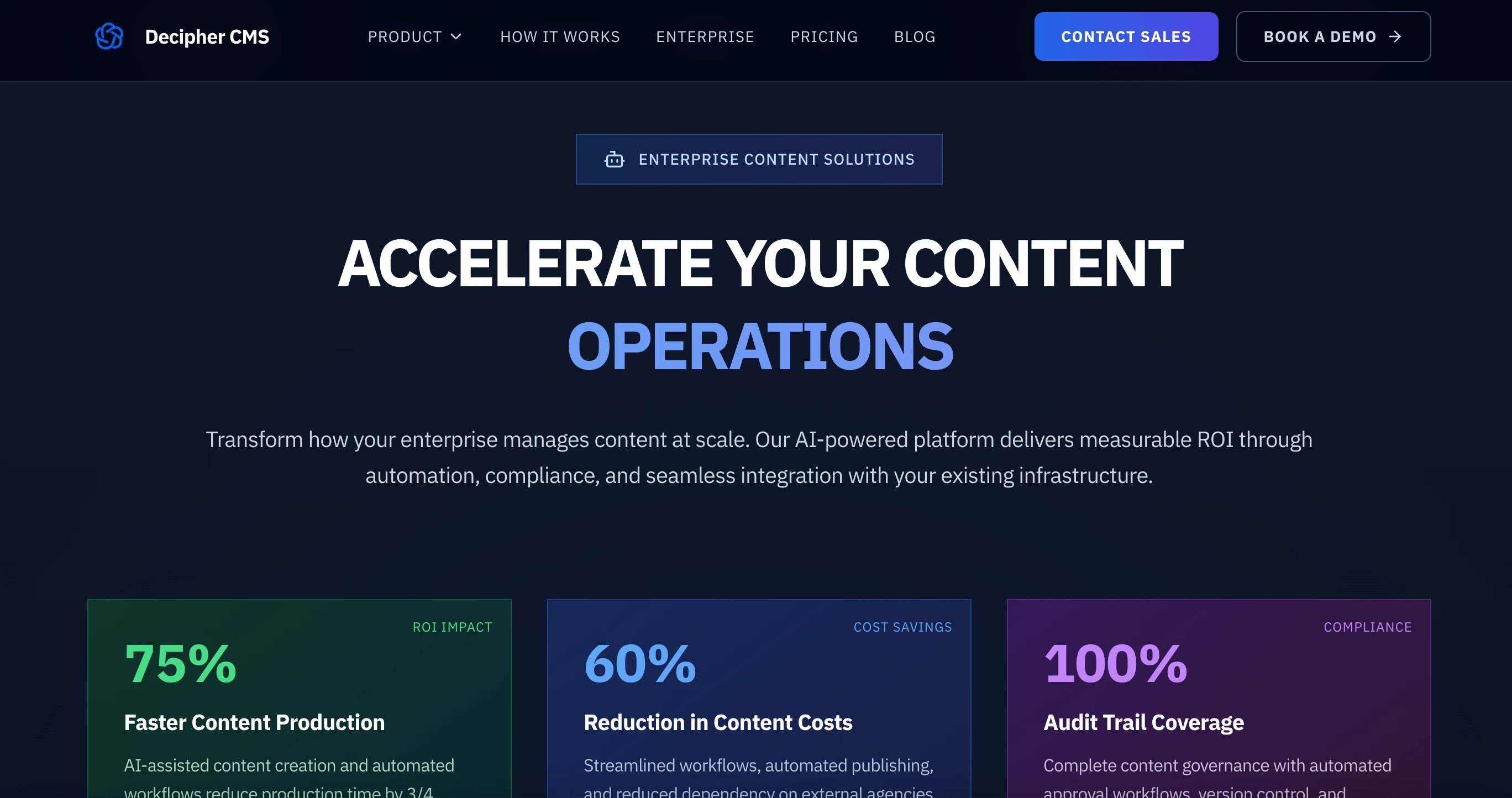
The 7 Best Content Management Systems of 2025
The content management game has completely changed, and most companies are getting left behind.
While everyone was busy adding more tools to their stack, content operations became the biggest bottleneck in modern businesses. Marketing teams are drowning in approval workflows, content is scattered across a dozen different platforms, and publishing anything feels like pushing a boulder uphill.
Sound familiar? You're not alone. We've analyzed the entire CMS market to find the platforms that actually solve these problems - not just add more complexity. Here are the seven content management systems that can turn your content chaos into a competitive advantage.
Here's what separates the real solutions from the feature-bloated pretenders:
What To Look for in a CMS?
The content management landscape has fundamentally shifted from simple publishing tools to comprehensive content operations platforms. Here is what to look for when deciding on a CMS for your business.
Growth-Ready Infrastructure - Your content operations will evolve faster than you think. What starts as a simple blog becomes multi-channel campaigns, then global content programs. The platform you choose needs to scale with your ambitions without forcing you to rebuild everything from scratch when you outgrow basic features.
Content Team Empowerment - If your marketing team needs to file a ticket every time they want to update a headline, you're bleeding productivity. The right platform gives content creators direct control over their workflows - from creation to publication - without technical bottlenecks slowing everything down.
Enterprise-Grade Security - Your content operations touch sensitive data, customer information, and business-critical workflows. Look for platforms with robust access controls, compliance frameworks, and security practices that meet enterprise standards - not consumer-grade tools with enterprise pricing.
Ecosystem Integration - Your CMS isn't an island. It needs to work seamlessly with your existing tech stack - CRM, marketing automation, analytics tools, and whatever specialized systems your business depends on. API-first architecture isn't nice to have, it's essential.
Total Cost Transparency - Don't get blindsided by hidden costs. Factor in implementation, training, ongoing customization, and scaling fees. The cheapest option upfront often becomes the most expensive when you account for the real costs of enterprise deployment.
Now that you understand what to look for, let’s explore your options.
The Seven Content Management Systems Transforming Business Operations
After extensive evaluation of enterprise content management platforms, these seven solutions represent the most effective options for companies serious about scaling their content operations. Each platform offers distinct advantages depending on your organization's specific needs, technical resources, and growth trajectory.
Decipher CMS
Decipher stands out as the only platform that combines enterprise infrastructure control with AI-powered content automation. Built specifically for scaling companies that need to maintain complete control over their content operations, Decipher offers unlimited usage through an enterprise licensing model that eliminates the per-seat pricing penalties that make other platforms prohibitively expensive as teams grow.
 The platform's AI content intelligence accelerates production by 75% through automated content creation assistance, intelligent quality scoring, and brand guideline integration that ensures consistency across all channels. The enterprise workflow engine provides customizable approval processes that integrate seamlessly with existing organizational structures, while automated routing ensures content flows efficiently to the right stakeholders without manual intervention.
The platform's AI content intelligence accelerates production by 75% through automated content creation assistance, intelligent quality scoring, and brand guideline integration that ensures consistency across all channels. The enterprise workflow engine provides customizable approval processes that integrate seamlessly with existing organizational structures, while automated routing ensures content flows efficiently to the right stakeholders without manual intervention.
What makes Decipher particularly compelling for enterprise clients is the self-hosted deployment option that runs on your own Google Cloud infrastructure. This approach provides unlimited scalability without usage penalties while maintaining complete control over data sovereignty and security configurations. Companies using Decipher typically see 60% cost reduction compared to agency-dependent approaches while tripling their content output.
Optimizely
has evolved from its A/B testing roots into a comprehensive digital experience platform with strong content management capabilities. The hybrid headless architecture provides flexibility for custom implementations while maintaining user-friendly content editing interfaces. The platform excels at experimentation and personalization, making it ideal for companies that prioritize data-driven optimization of their content performance.
However, Optimizely's complexity and high costs can be prohibitive for content-focused teams that need velocity over experimentation sophistication. The platform requires significant technical resources to implement effectively, and the lack of built-in AI automation means content teams still rely heavily on manual processes for creation and optimization.
Adobe Experience Manager
represents the premium end of enterprise content management, offering deep integration with the broader Adobe ecosystem. For organizations already invested in Adobe Creative Cloud and marketing tools, AEM provides seamless workflows that leverage existing asset libraries and design systems.
The platform's enterprise features are comprehensive, but the implementation complexity and costs often exceed what most organizations need for effective content operations. The user interface feels outdated compared to modern alternatives, and content teams frequently struggle with workflows that prioritize technical flexibility over operational efficiency.
Sitecore
has built a strong reputation in enterprise circles for its personalization capabilities and robust security features. The platform handles complex content scenarios well and provides the enterprise-grade infrastructure that large organizations require for mission-critical applications.
The challenge with Sitecore lies in its resource requirements and operational complexity. Content teams often find the workflows slow and cumbersome, while the high costs and need for dedicated technical support make it difficult to justify for organizations focused primarily on content velocity and operational efficiency.
Contentful
pioneered the headless CMS approach and remains a strong choice for developer-heavy teams building custom digital experiences. The API-first architecture provides maximum flexibility for technical implementations, while the content modeling capabilities support complex content structures.
For marketing teams focused on content operations rather than custom development, Contentful's learning curve can be steep. The platform lacks built-in AI assistance for content creation, and costs can escalate quickly as usage grows. Organizations often find themselves needing additional tools to handle workflow management and multi-channel publishing effectively.
Drupal
particularly through enterprise distributions like Acquia, offers unmatched customization capabilities for organizations with specific technical requirements. The open-source foundation provides flexibility that proprietary platforms cannot match, while enterprise support options address security and compliance needs.
The trade-off comes in operational complexity and resource requirements. Content teams often struggle with Drupal's user experience, while the platform requires significant development resources to implement and maintain effectively. For organizations without dedicated technical teams, the total cost of ownership can exceed more user-friendly alternatives.
WordPress
provides enterprise-grade hosting and support for the world's most popular content management system. The familiar interface reduces training requirements, while the extensive plugin ecosystem offers solutions for almost any content management need.
Despite its popularity, WordPress faces limitations in enterprise environments. Security concerns require constant attention, workflow management relies heavily on manual processes, and the platform lacks the AI-powered automation that modern content teams need to achieve competitive velocity.
Making the Strategic Decision for Your Content Operations
Here's the reality: most companies choose their CMS based on a flashy demo, then spend the next two years fighting with limitations they never saw coming.
Don't be that company. Here's how to actually evaluate these platforms:
See the real product in action - Not the sanitized demo version, but how it handles messy, real-world content operations
Find honest user feedback - Look beyond the testimonials to find actual users willing to share the good, bad, and ugly about daily usage
Compare apples to apples - Take the same content challenge and see how each platform handles it, side by side
Your future content team will thank you for doing the homework now instead of dealing with platform regret later.
If you need a demo of Decipher, reach out here to book a live demo.

